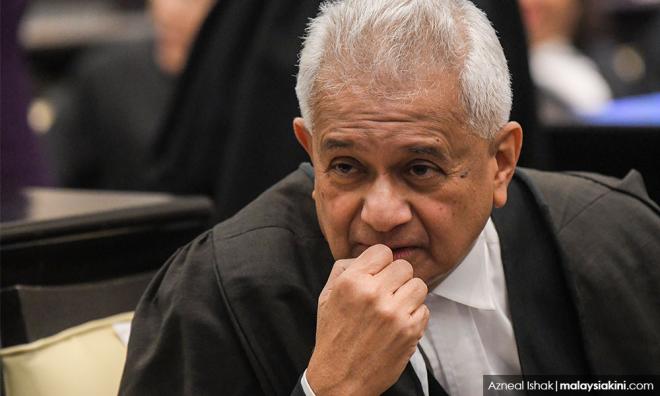
Attorney-General Tommy Thomas today responded to criticism against him for purportedly instructing the sexual abuse case involving a religious school student in Perak to be dismissed.
Clarifying the matter, Thomas said he had never issued such an instruction.
However, he confirmed that the Perak Prosecution Office did send a letter to the magistrate to explain that the magistrate had erred in invoking Section 133 of the Criminal Procedure Code, which allows a magistrate to examine a complainant.
Thomas said Section 133 can only be invoked if police had failed to conduct an investigation.
He added that police had investigated the matter twice but concluded that there was not enough evidence, resulting in the case to be classified as "No Further Action".
It was in this context, he said, that the examination under Section 133 was dismissed.
His full statement is as follow:
Public interest in this matter requires the true facts to be disclosed. Police investigation into this case began with police reports lodged by a mother on Aug 14, 2016 claiming that her minor son, then aged 10 years old (the victim), was alleged to have been sexually molested by three senior students, aged between 12 to 18 years old (the suspects), at their school in Manjoi, Perak.
Police conducted their investigations by interviewing the victim, the suspects and witnesses such as teachers, staff and the victim’s roommates and other schoolmates.
The victim had also undergone a medical examination at a public hospital.
The statements recorded by the police and the medical report formed part of the investigation papers (IP) that were in the usual way referred to the Attorney-General's Chambers for decision.
The IP was considered by chambers. The deputy public prosecutor (DPP) assigned to the matter was of the view that no offence had been committed.
As there was no other evidence then available for the police to conduct further investigation, "No Further Action" (NFA) was ordered by the DPP in September 2016.
The matter rested there. The IP was reopened in February 2017 following availability of new evidence and the IP was resubmitted to this chambers.
The DPP assigned to the case reviewed every piece of evidence made available by the police, including the new evidence. Due to insufficient evidence to prove a prima facie case against the suspect(s) or anyone else, the DPP concluded for a second time in February 2018 that investigation need not continue.
Again, the matter rested there until the involvement of a magistrate. A complaint letter dated June 3, 2019 was sent by the mother to the magistrate.
In her letter, the mother complained that no action had been taken against the alleged perpetrators although she had previously lodged two police reports in 2016.
Her letter was not copied to this chambers. The magistrate decided to take cognisance of the mother’s complaint. On Aug 5, 2019, the magistrate served on the Perak State Public Prosecutor’s Office a notice to state that this case had been fixed on Oct 9, before the magistrate for the mother to be examined in relation to her complaint letter.
The examination was to be conducted by the magistrate purportedly in the exercise of the Magistrate’s power under Section 133 of the CPC.
The Perak Prosecution Office responded to the magistrate by letter dated Aug 27, giving information on the actual status of the investigation and explaining that NFA was ordered.
The Perak Prosecution Office explained that the mother should not have filed a complaint under Section 133 of the CPC because the police had opened investigation papers in relation to the mother’s police reports lodged in 2016, the matter was investigated and NFA decision was taken by the DPP.
Last week, the media reported that the magistrate dismissed the mother’s application under Section 133 of the CPC. A news portal, Malay Mail reported on Oct 14, 2019 that the magistrate made the decision after the court was provided with a letter from the Perak State Legal Adviser’s Office detailing a written directive by me under Article 145(3) of the Federal Constitution.
The report was untrue. There was no written directive issued by me and in fact, none was mentioned in the Perak Prosecution Office’s letter to the magistrate.
The same report also stated that the Malay Mail was seeking clarification from me as to why the case was ordered to be dismissed. Again, this is untrue.
Neither this chambers’ public relation office nor I personally have received any enquiry for clarification from the Malay Mail. Their inaccurate report of Oct 14 was picked up by numerous other portals.
In law, the magistrate should not have taken cognisance under Section 133. The mother’s complaint that no investigation was conducted in relation to her police reports in 2016 was not true.
The magistrate could only exercise his or her power to examine the complainant under Section 133 of the CPC, if no investigation was conducted at all by the police, which clearly was not the case.
Further, the DPP’s decision to NFA this case is in the exercise of the attorney-general’s power under Article 145(3) of the Federal Constitution.
The constitution confers on the attorney-general (as public prosecutor) the “power exercisable at his discretion, to institute, conduct or discontinue any proceedings for any offence”.
He has control and direction with respect to all criminal prosecutions under the law. In the instant case, as in thousands of other cases, the power not to institute criminal proceedings/NFA was exercised by a DPP on behalf of the public prosecutor. - Mkini



I hope syedalwaysbetol read the statement of ag.
ReplyDelete